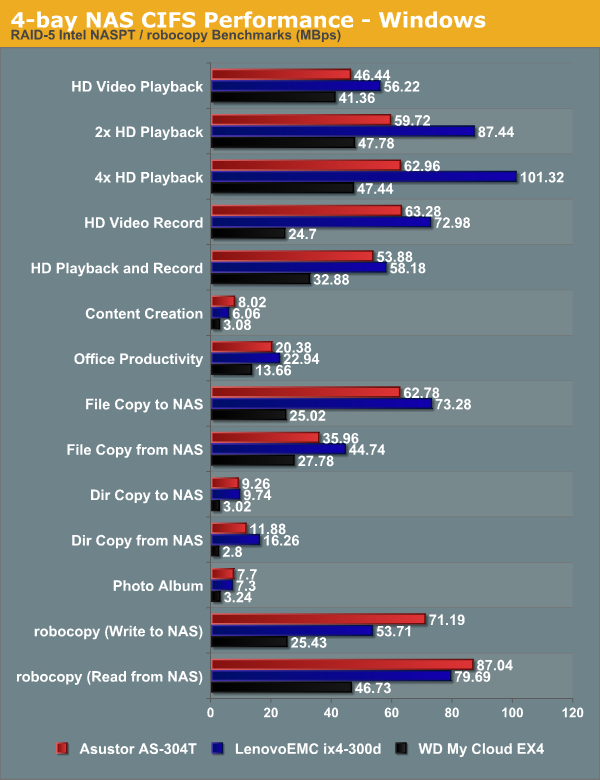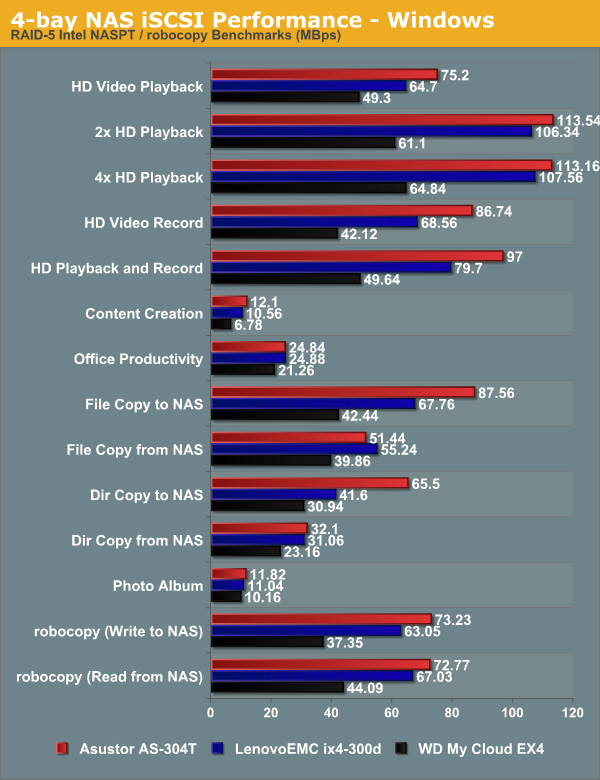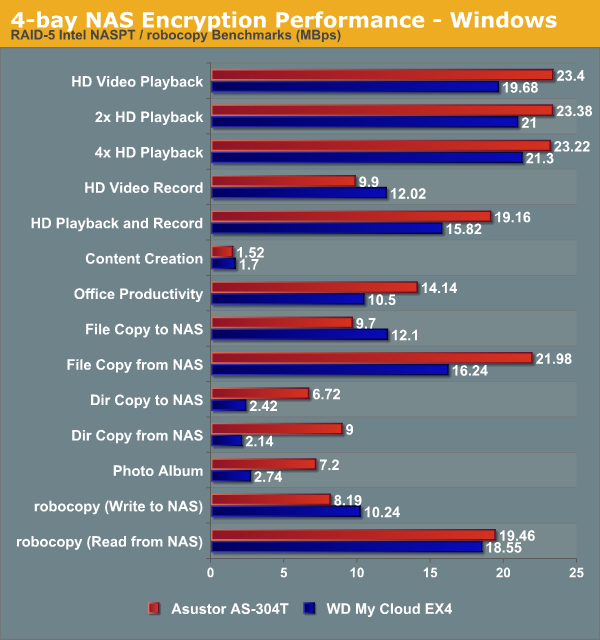Asustor AS-304T: 4-Bay Intel Evansport NAS Review
by Ganesh T S on March 26, 2014 11:15 AM ESTSingle Client Performance - CIFS & iSCSI On Windows
The single client CIFS performance of the Asustor AS-304T was evaluated on the Windows platforms using Intel NASPT and our standard robocopy benchmark. This was run from one of the virtual machines in our NAS testbed. All data for the robocopy benchmark on the client side was put in a RAM disk (created using OSFMount) to ensure that the client's storage system shortcomings wouldn't affect the benchmark results. It must be noted that all the shares / iSCSI LUNs are created in a RAID-5 volume.

The above numbers present some interesting results. The ARMADA XP-based ix4-300d manages to beat the AS-304T in multiple workloads. Based on the above graph alone, it might appear as if the ix4-300d is much better, but the AS-304T manages to take the lead in certain common workloads as well as feature set (hot-swap capability, for instance).
We created a 250 GB iSCSI target and mapped it on the Windows VM. The same benchmarks were run and the results are presented below. The x86-based AS-304T handily beats the other 4-bay NAS units that we have evaluated (all of which are ARM-based).

Encryption Support Evaluation
Consumers looking for encryption capabilities can opt to encrypt a iSCSI share with TrueCrypt or some in-built encryption mechanism in the client OS. However, if requirements dictate that the data must be shared across multiple users / computers, relying on encryption in the NAS is the best way to move forward. Most NAS vendors use the industry-standard 256-bit AES encryption algorithm. One approach is to encrypt only a particular shared folder while the other approach is to encrypt the full volume. Asustor supports only folder-level encryption in ADM.
On the hardware side, encryption support can be in the form of specialized hardware blocks in the SoC (common in ARM / PowerPC based NAS units). In x86-based systems, accelerated encryption support is dependent on whether the AES-NI instruction is available on the host CPU. The Atom CPU in the Evansport SoC doesn't support AES-NI, but the SoC does have a security engine. Unfortunately, Asustor's firmware doesn't take advantage of the security engine's APIs. The encryption is done using the host CPU and the performance is hit heavily. We enabled encryption on a a CIFS share to repeat our Intel NASPT / robocopy benchmarks. The results are presented in the graph below

Enabling encryption pulls down the performance numbers, most times by more than 50%. In terms of raw numbers, the performance is sometimes even worse than what can be obtained from ARM-based 4-bay units. If encryption is important, it might be better to wait for the next generation of Atom-based NAS units (the new Atom CPUs have AES-NI) or opt for a higher-end unit sporting a CPU with AES-NI capabilities.










34 Comments
View All Comments
jason42 - Wednesday, March 26, 2014 - link
Anyone know of any small mini-ITX cases that allow for hotswapping hard drives and doesn't look cheap? I'd like to make my one home NAS/media transcoder/HTPC.Thanks!
Aikouka - Thursday, March 27, 2014 - link
I don't know if you need this many hotswappable bays, but there's the Silverstone DS380:http://www.silverstonetek.com/product.php?pid=452
ganeshts - Thursday, March 27, 2014 - link
Yes, the DS380 is pretty awesome-looking :) It keeps components cool.. only problem is footprint. The U-NAS NSC800 is pretty good too, smaller footprint - same as the DS1812+, but comes at the cost of airflow and cooling capability, obviously.signorRossi - Thursday, March 27, 2014 - link
Lian-Li has various models, the PC-Q25 offers 7! 3.5" hard drive bays, with 5 of them hot-swap slots.buchhla - Friday, March 28, 2014 - link
http://www.u-nas.com/xcart/product.php?productid=1... This is the 8 bay version, but they also make a 2 and 4.manmax - Wednesday, March 26, 2014 - link
It looks like you're using the default mount options for NFS and CIFS mounts on a CentOS 6.2 VM. It would be nice if you actually show what the mount options CentOS uses. For example, using mount without passing any options via the -o parameter to mount a CIFS share could result in the following default options:rw,relatime,vers=1.0,cache=strict,uid=1000,forceuid,gid=1000,forcegid,addr=123.123.123.123,file_mode=0666,dir_mode=0777,rsize=61440,wsize=65536,actimeo=1
rsize and wsize in particular could have a noticeable affect on performance.
iwod - Wednesday, March 26, 2014 - link
Let me get this one thing straight.Asustor wins Hands down in terms of performance compared to Synology or Qnap. So if performance is a concern you should get it. Purely because they are using much better hardware.
However DONT expect its features and software work anywhere as well as Qnap or Synology. If you are after those features, dont get the ASUSTOR yet. Its software properly still needs some time ( a year ? ) to mature. I have heard they are working on it. But as far as i know it still isn't quite there yet.
larkhon - Thursday, March 27, 2014 - link
I think this is even more relevant when talking about the entry level NAS from those brands, Asustor is doing a good job there. But does this one compare to DS414 in terms of performance? price-wise it's the same but it's saturating a single GbE link in many situations hence the second link...beginner99 - Thursday, March 27, 2014 - link
Why would you even use RAID in these? Look at the rebuild times (assuming it doesn't fail which however is pretty likes with 2 TB+ drives). It seems easier and faster to just copy back the data from your backup.fteoath64 - Thursday, March 27, 2014 - link
You have a great point on those long rebuild times. It is during such stressing times that another drive might fail so with all eggs being put on the NAS is not such a good idea. Still people will backup periodically to a 4TB or bigger drive just to preserve some of their important data. It is a practise that cannot be forgotten even with a NAS. It STILL needs backup!.